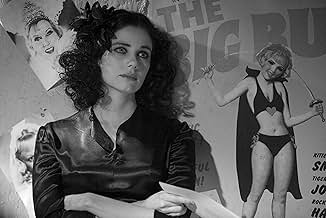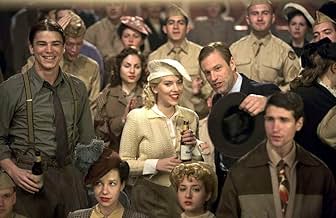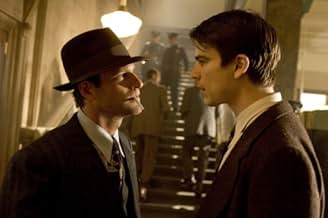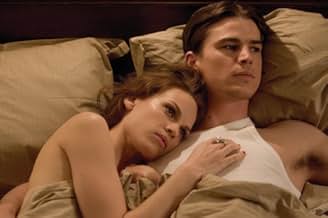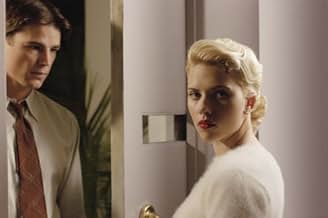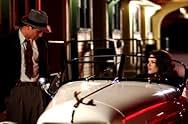ब्लैक डाहलिया एलिज़ाबेथ शार्ट की हत्या की जांच के परिणाम स्वरूप दो पुलिसकर्मी अपने व्यक्तिगत और पेशेवर जीवन को बिखरते हुए देखते हैं.ब्लैक डाहलिया एलिज़ाबेथ शार्ट की हत्या की जांच के परिणाम स्वरूप दो पुलिसकर्मी अपने व्यक्तिगत और पेशेवर जीवन को बिखरते हुए देखते हैं.ब्लैक डाहलिया एलिज़ाबेथ शार्ट की हत्या की जांच के परिणाम स्वरूप दो पुलिसकर्मी अपने व्यक्तिगत और पेशेवर जीवन को बिखरते हुए देखते हैं.
- निर्देशक
- लेखक
- स्टार
- 1 ऑस्कर के लिए नामांकित
- 4 जीत और कुल 16 नामांकन
Angus MacInnes
- Capt. John Tierney
- (as Angus MacInnis)
फ़ीचर्ड समीक्षाएं
"For murder, though it have no tongue, will speak/With most miraculous organ." Shakespeare's Hamlet
Murders are messy on the screen and in real life; screenplays about them can be chaotic and disjointed also. Such is the case with Black Dahlia, a film noir from Brian De Palma, a past master of the macabre and the complicated (Blow Out, Body Double). It has all the trappings of a first-rate detective novel (James Ellroy) made into a 1940's thriller with appropriately moody music of the soulful trumpet (Mark Isham), lush production design (Dante Ferretti), and equally impressive costuming (Jenny Beavan), all set in a timelessly seedy Los Angeles.
There's also the conflicted, sometimes dark hero detective (Josh Hartnett) and the sexy, dangerous femme fatale (Hilary Swank), accompanied by the questionably good voluptuary sex bomb (Scarlett Johansson). As if these noir troublemakers were not enough, writer Josh Friedman seemingly adapts Ellroy's every subplot, every story thread, as if each had to be accounted for in the best CSI tradition.
The original novel was based on aspiring actress Elizabeth Short's unsolved grizzly murder in 1947. After a considerably convoluted exposition, with plot lines rarely intersecting in a unified way, the film has the nerve to offer one of the most extensive denouements in film history, could be a half hour, with lengthy explanation of how all those ends tied together. Needless to say, anti climaxes abound in this last segment, leaving not only more confusion about the plot but also a desire to get back to The Big Sleep without sleeping, a state Black Dahlia threatened several times.
Hartnett's detective says, "Nothing stays buried forever. Nothing." I say this weak noir wannabe should stay buried until a bright 22nd century scholar sees its cultural and aesthetic significance. Until then, it's a jumble of plot points resolved in the end by tedious narration. Even Scarlett Johansson's pulchritude couldn't win me, and that's murder in the first degree.
Murders are messy on the screen and in real life; screenplays about them can be chaotic and disjointed also. Such is the case with Black Dahlia, a film noir from Brian De Palma, a past master of the macabre and the complicated (Blow Out, Body Double). It has all the trappings of a first-rate detective novel (James Ellroy) made into a 1940's thriller with appropriately moody music of the soulful trumpet (Mark Isham), lush production design (Dante Ferretti), and equally impressive costuming (Jenny Beavan), all set in a timelessly seedy Los Angeles.
There's also the conflicted, sometimes dark hero detective (Josh Hartnett) and the sexy, dangerous femme fatale (Hilary Swank), accompanied by the questionably good voluptuary sex bomb (Scarlett Johansson). As if these noir troublemakers were not enough, writer Josh Friedman seemingly adapts Ellroy's every subplot, every story thread, as if each had to be accounted for in the best CSI tradition.
The original novel was based on aspiring actress Elizabeth Short's unsolved grizzly murder in 1947. After a considerably convoluted exposition, with plot lines rarely intersecting in a unified way, the film has the nerve to offer one of the most extensive denouements in film history, could be a half hour, with lengthy explanation of how all those ends tied together. Needless to say, anti climaxes abound in this last segment, leaving not only more confusion about the plot but also a desire to get back to The Big Sleep without sleeping, a state Black Dahlia threatened several times.
Hartnett's detective says, "Nothing stays buried forever. Nothing." I say this weak noir wannabe should stay buried until a bright 22nd century scholar sees its cultural and aesthetic significance. Until then, it's a jumble of plot points resolved in the end by tedious narration. Even Scarlett Johansson's pulchritude couldn't win me, and that's murder in the first degree.
Dante Ferretti's set design beautifully evokes the 1940's; Vilmos Zsigmond's cinematography enhances the period look; and the voice-over narration has been pulled from film-noir classics. While Brian De Palma's "The Black Dahlia" has much of the look and feel of Curtis Hanson's 1997 "L.A. Confidential," that far superior film boasted better performances and a well-written screenplay. Although both films were based on James Ellroy novels and both had complicated, involved plots, the Hanson film came together with satisfying logic. Unfortunately, De Palma's movie is equally if not more complex and leaves a few threads dangling or at least badly frayed.
Although loosely based on a famous Hollywood murder, "The Black Dahlia" spends more time than necessary in establishing the three-way partnership, if not ménage, between Josh Hartnett, Scarlett Johansson, and Aaron Eckhart. The leisurely pace allows viewers to ponder the last time that they saw a film with so many double letters in the stars' names. The trailer, which has played in theaters for weeks, was misleading, and the actual murder and resulting investigation do not begin until well into the film after we have witnessed boxing scenes between the police investigators, Hartnett and Eckhart, and some three-way flirtations that do little to advance the proceedings.
The film only becomes interesting when the campy upper crust Linscott family enters. Hilary Swank as Madeleine Linscott is a deadly femme in black and as fatale as they come. Fiona Shaw as her mother shamelessly steals scenes and chews the banisters in her few minutes on screen, and John Kavanagh as Emmet Linscott adds to the family's quirky personality. An entire film could have been constructed around the Linscotts that would have been far more interesting than the Hartnett-Johansson-Eckhart romance. Scarlett has little to do but purse her luscious red lips and look desirable in tight blouses, which she does quite well. Josh is all squinty-eyed intensity and muscled charm, which he does quite well. Aaron tries for more, but goes a bit over the top; perhaps he would have been more comfortable playing a cousin of the Linscotts.
Although "The Black Dahlia" is not the worst way to spend two hours, the film's pedigree would lead viewers to expect more. Only a week after the less-disappointing "Hollywoodland," De Palma's take on another old Hollywood mystery should have been riveting. All of the essentials were there, except possibly a seasoned troop of stars, for another "L.A. Confidential." Unfortunately, what arrived was a nearly indecipherable mystery within a tedious love triangle that was wrapped in multi-million dollar production values.
Although loosely based on a famous Hollywood murder, "The Black Dahlia" spends more time than necessary in establishing the three-way partnership, if not ménage, between Josh Hartnett, Scarlett Johansson, and Aaron Eckhart. The leisurely pace allows viewers to ponder the last time that they saw a film with so many double letters in the stars' names. The trailer, which has played in theaters for weeks, was misleading, and the actual murder and resulting investigation do not begin until well into the film after we have witnessed boxing scenes between the police investigators, Hartnett and Eckhart, and some three-way flirtations that do little to advance the proceedings.
The film only becomes interesting when the campy upper crust Linscott family enters. Hilary Swank as Madeleine Linscott is a deadly femme in black and as fatale as they come. Fiona Shaw as her mother shamelessly steals scenes and chews the banisters in her few minutes on screen, and John Kavanagh as Emmet Linscott adds to the family's quirky personality. An entire film could have been constructed around the Linscotts that would have been far more interesting than the Hartnett-Johansson-Eckhart romance. Scarlett has little to do but purse her luscious red lips and look desirable in tight blouses, which she does quite well. Josh is all squinty-eyed intensity and muscled charm, which he does quite well. Aaron tries for more, but goes a bit over the top; perhaps he would have been more comfortable playing a cousin of the Linscotts.
Although "The Black Dahlia" is not the worst way to spend two hours, the film's pedigree would lead viewers to expect more. Only a week after the less-disappointing "Hollywoodland," De Palma's take on another old Hollywood mystery should have been riveting. All of the essentials were there, except possibly a seasoned troop of stars, for another "L.A. Confidential." Unfortunately, what arrived was a nearly indecipherable mystery within a tedious love triangle that was wrapped in multi-million dollar production values.
De Palma's staged, theatrical style has always felt like an in-joke: an expressive homage (or sometimes a slap in the face) to the conventions of cinema. And in the case of his high- energy thrillers, the joke is funny and damned entertaining. But in the case of his dramas, De Palma constantly walks a thin line between evocative melodrama and camp (The wonderful "Carlito's Way," in my opinion, is the exception). And "The Black Dahlia" often steps over that line.
With a steady build-up of noir conventions, the film hearkens to the expressionistic film and acting styles of the 40's -- a style which can induce giggles in audiences raised on irony. And I can count a few musical swells, flamboyant acting choices and dramatic fade-outs which caused unwanted comic relief. Or did it? If there's one thing De Palma loves more than entertaining his audience, it's confounding them. How else do you explain the two-hour joke that was "Raising Cain"? (Although I, for one, found that particular joke damned funny).
You watch "Dahlia" with the distinct impression that De Palma is enjoying every minute of it. He's copying Wilder, Welles and, you guessed it, Hitchcock -- and he's having a blast doing it. So when Josh Hartnett's character pulls a full dinner setting (including the turkey) off a table and throws Scarlett Johansson down lustfully upon it, should we also smile and remember "Double Indemnity"? I guess it would help if you've seen "Double Indemnity."
That said, the film's biggest flaw is that it smiles at itself for so long that it leaves little time to wrap up the plot. The onslaught of last-reel revelations seems to exist only to give the actors more opportunity to relish in the delicious mood De Palma has created. We never really cared about the plot in the first place because De Palma didn't care about it either. He's more interested in the shadows, the thrills, the drama, the lurking killers, swelling music, lusty confrontations and blood splatters. And the plot points get lost somewhere in the mix. So who can blame us for glazing over when Hartnett finally starts to care about the mysteries rather than just being mystified by them? De Palma has painted such an odd, exciting picture (even when it turns to camp) that the audience would rather keep watching the elaborate set-ups than sit through the convoluted solutions.
But then again, what good is a joke without a satisfying punch line?
With a steady build-up of noir conventions, the film hearkens to the expressionistic film and acting styles of the 40's -- a style which can induce giggles in audiences raised on irony. And I can count a few musical swells, flamboyant acting choices and dramatic fade-outs which caused unwanted comic relief. Or did it? If there's one thing De Palma loves more than entertaining his audience, it's confounding them. How else do you explain the two-hour joke that was "Raising Cain"? (Although I, for one, found that particular joke damned funny).
You watch "Dahlia" with the distinct impression that De Palma is enjoying every minute of it. He's copying Wilder, Welles and, you guessed it, Hitchcock -- and he's having a blast doing it. So when Josh Hartnett's character pulls a full dinner setting (including the turkey) off a table and throws Scarlett Johansson down lustfully upon it, should we also smile and remember "Double Indemnity"? I guess it would help if you've seen "Double Indemnity."
That said, the film's biggest flaw is that it smiles at itself for so long that it leaves little time to wrap up the plot. The onslaught of last-reel revelations seems to exist only to give the actors more opportunity to relish in the delicious mood De Palma has created. We never really cared about the plot in the first place because De Palma didn't care about it either. He's more interested in the shadows, the thrills, the drama, the lurking killers, swelling music, lusty confrontations and blood splatters. And the plot points get lost somewhere in the mix. So who can blame us for glazing over when Hartnett finally starts to care about the mysteries rather than just being mystified by them? De Palma has painted such an odd, exciting picture (even when it turns to camp) that the audience would rather keep watching the elaborate set-ups than sit through the convoluted solutions.
But then again, what good is a joke without a satisfying punch line?
Fictional movie based on a real unsolved Hollywood murder in the 1940s. The mutilated body of Elizabeth Short (Mia Kirschner) is found in an empty lot. Officer Dwight Bleichert (Josh Harnett) and Sgt. Leland Blanchard (Aaron Eckhart) are assigned to the case. Blanchard becomes obsessed with the case causing troubles with his girlfriend Kay Lake (Scarlett Johansson). She then falls for Bleichert. Then there are more murders and lesbians and incest are thrown in...
The plot is a little too convoluted but so was the book (by Jack Ellroy). To be totally honest I can't understand why this is getting blasted by the critics. It's no masterpiece but it's 100 times better than director Brian DePalma's last film (2002's terrible "Femme Fatale") and probably his best work since 1996's "Mission Impossible". The 1940s setting is beautifully captured with clothes and settings--this film really looks great. DePalma once again gives us some incredible visual sequences--one murder is downright terrifying and one of the best things he's done in years. Also the plot, while involved, does reach a logical, satisfying conclusion. However the film isn't perfect.
There's a lesbian bar here that's really overdone. It's beautiful, with a ridiculously elaborate stage show--but in 1940s Hollywood? I don't think so. The acting is all over the place. Eckhart OVERACTS to a ridiculous degree. Hartnett is terrible (no surprise there) but so are Johansson and Hilary Swank (both wonderful actresses). It seems like Harnett's presence bring them down to his level of non acting. Last, and least, is English actress Fiona Lewis who is certainly acting but not in this picture. She overdoes it so much she makes Eckhart look restrained.
So I DID like it but with a tighter story and a better leading man this might have been great. As it stands it's a very good, well-made movie with some questionable acting. I give it a 7.
The plot is a little too convoluted but so was the book (by Jack Ellroy). To be totally honest I can't understand why this is getting blasted by the critics. It's no masterpiece but it's 100 times better than director Brian DePalma's last film (2002's terrible "Femme Fatale") and probably his best work since 1996's "Mission Impossible". The 1940s setting is beautifully captured with clothes and settings--this film really looks great. DePalma once again gives us some incredible visual sequences--one murder is downright terrifying and one of the best things he's done in years. Also the plot, while involved, does reach a logical, satisfying conclusion. However the film isn't perfect.
There's a lesbian bar here that's really overdone. It's beautiful, with a ridiculously elaborate stage show--but in 1940s Hollywood? I don't think so. The acting is all over the place. Eckhart OVERACTS to a ridiculous degree. Hartnett is terrible (no surprise there) but so are Johansson and Hilary Swank (both wonderful actresses). It seems like Harnett's presence bring them down to his level of non acting. Last, and least, is English actress Fiona Lewis who is certainly acting but not in this picture. She overdoes it so much she makes Eckhart look restrained.
So I DID like it but with a tighter story and a better leading man this might have been great. As it stands it's a very good, well-made movie with some questionable acting. I give it a 7.
Now I like Brian DePalma, and I love Carrie, The Untouchables and Carlito's Way. Out of the films of his I've seen, The Black Dahlia is my least favourite in my view, though I was also rather disappointed in Scarface too.
I was really interested in its concept and the story seemed interesting. Also the film is very well made, with stylish cinematography and beautiful scenery, costumes, sets and makeup, DePalma's direction has occasional flashes of brilliance and the music was quite nice as well.
However, this is another case of style over substance. The script falls flat, with little idea of which direction to go, and the tone of the story is also uneven with some scenes disappointingly over-the top. The characters I felt indifferent to, and I also thought they were quite shallow and poorly explored, the pace is rather meandering and with exception of Fiona Shaw who's quite good the acting is bland. Also the ending I think is overdone.
All in all, interesting initially and while well made it is emotionally hollow and flat in its scripting and characterisation. 4/10 Bethany Cox
I was really interested in its concept and the story seemed interesting. Also the film is very well made, with stylish cinematography and beautiful scenery, costumes, sets and makeup, DePalma's direction has occasional flashes of brilliance and the music was quite nice as well.
However, this is another case of style over substance. The script falls flat, with little idea of which direction to go, and the tone of the story is also uneven with some scenes disappointingly over-the top. The characters I felt indifferent to, and I also thought they were quite shallow and poorly explored, the pace is rather meandering and with exception of Fiona Shaw who's quite good the acting is bland. Also the ending I think is overdone.
All in all, interesting initially and while well made it is emotionally hollow and flat in its scripting and characterisation. 4/10 Bethany Cox
क्या आपको पता है
- ट्रिवियाWhen Dwight "Bucky" Bleichert goes searching through some photographs, you can see a real autopsy photo of Elizabeth Short.
- गूफ़When Bucky Bleichert enters Sheryl Saddon's bedroom to get the suitcase, there is a postcard-sized picture of Bettie Page on the wall. Bettie Page did not start modeling until 1950.
- भाव
Emmet Linscott: What kind of name is Bleichert? Dutch?
Ofcr. Dwight "Bucky" Bleichert: German.
Emmet Linscott: Ah, a great people, the Germans. Hitler was a bit excessive. But mark my words that someday we'll regret not joining forces with him to fight the Reds.
- साउंडट्रैकIn the Mood
Written by Joe Garland (as Joseph C. Garland)
Used by Permission of Shapiro Bernstein & Co. Inc. (ASCAP)
टॉप पसंद
रेटिंग देने के लिए साइन-इन करें और वैयक्तिकृत सुझावों के लिए वॉचलिस्ट करें
- How long is The Black Dahlia?Alexa द्वारा संचालित
- What is "The Black Dahlia" about?
- Is "The Black Dahlia" based on a true story?
- How was "The Black Dahlia" received by critics and audiences?
विवरण
- रिलीज़ की तारीख़
- कंट्री ऑफ़ ओरिजिन
- भाषाएं
- इस रूप में भी जाना जाता है
- La Dalia Negra
- फ़िल्माने की जगहें
- उत्पादन कंपनियां
- IMDbPro पर और कंपनी क्रेडिट देखें
बॉक्स ऑफ़िस
- बजट
- $5,00,00,000(अनुमानित)
- US और कनाडा में सकल
- $2,25,45,080
- US और कनाडा में पहले सप्ताह में कुल कमाई
- $1,00,05,895
- 17 सित॰ 2006
- दुनिया भर में सकल
- $4,93,32,692
- चलने की अवधि2 घंटे 1 मिनट
- रंग
- ध्वनि मिश्रण
- पक्ष अनुपात
- 2.35 : 1
इस पेज में योगदान दें
किसी बदलाव का सुझाव दें या अनुपलब्ध कॉन्टेंट जोड़ें








